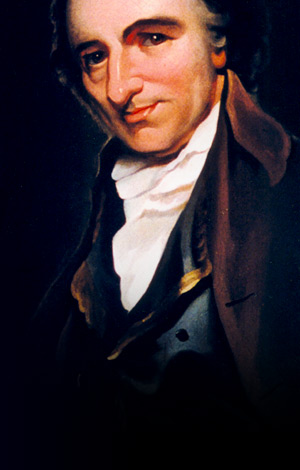Study Guide
FREEDOM WITH SACRIFICE
“Those
who expect to reap the benefit of freedom, must, like men, undergo the fatigues
of supporting it.”
Crisis IV, 1777
“Heaven knows how to put a proper price on its goods; and it would be strange indeed if so celestial an article as FREEDOM should not be highly rated… lay your shoulders to the wheel…Let it be told to the future world, that in the depth of winter, when nothing but hope and virtue could survive, that the city and the country, alarmed at one common danger, came forth to meet and repel it.”
Crisis 1, December 1776
“I love the man that can smile in trouble, that can gather strength from distress, and grow brave by reflection. ‘Tis the business of little minds to shrink; but he whose heart is firm, and whose conscience approves his conduct, will pursue his principles unto death.”
The Crisis, No. 1
Commentary
Confucius said, “To see what is right and not to do it, is want of courage or principle.” A universal principle is like a moral compass, a rational basis for making a decision overtime, but how it is expressed in particular situations will vary and will be difficult and complex. Others may not share our principles, but if the universal is also in the particular, however latent, conflicts can be useful because respecting differences allows one to learn about one’s own point of view while drawing out relevant principles. If one self-consciously practices a principle over time, one can gain clarity and go the “heart” of a situation while individually exemplifying, in modes like Gandhi and King, a sense of universal responsibility . Thus, one can appreciate the Persian proverb which declares that when times get darker, it is easier to see the light.
Paine put these most poignantly when he said:
“These are the times that try men’s souls...The summer soldier and the sunshine patriot will, in this crisis, shrink from the service of their country; but he that stands it now, deserves the love and thanks of man and woman. Tyranny, like hell, is not easily conquered; yet we have this consolation with us, that the harder the conflict, the more glorious the triumph. What we obtain too cheaply, we esteem too lightly: it is dearness only that gives everything its value.”
The American Crisis
Questions
- In today’s world, what are “the fatigues” of supporting individual freedom?
- How can we spread hope and virtue as sustainable “contagions” with and through others in the midst of a “time of troubles”?
- Is Malala Yousafzai, the Pakistani girl who stood up for education and was shot, a contemporary example? Who might be other contemporary examples?
“…Thomas Paine’s central place in an American radical tradition stretching from the Revolution to the present...reminds us how Paine’s words still resonate in American society today.”
Eric Foner, Columbia University


